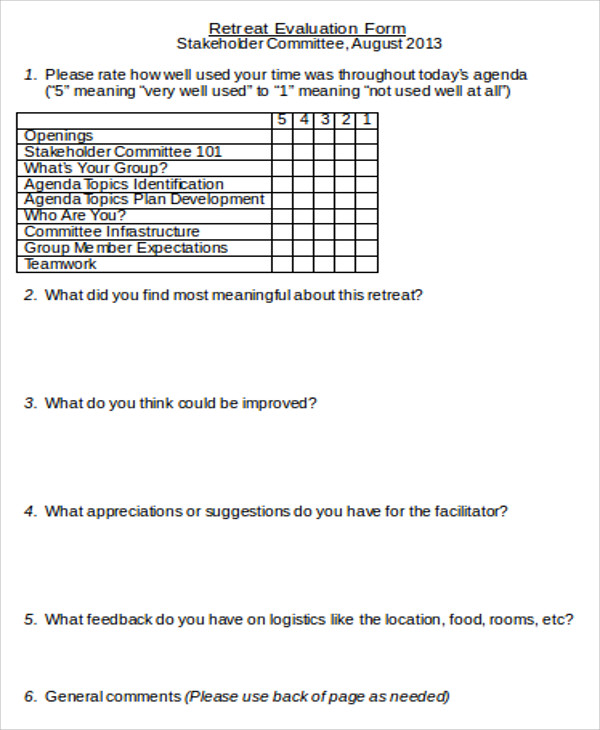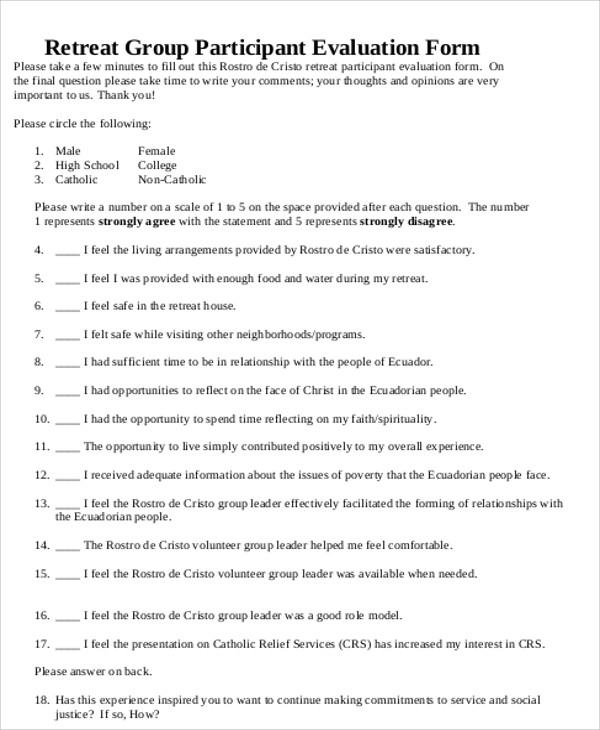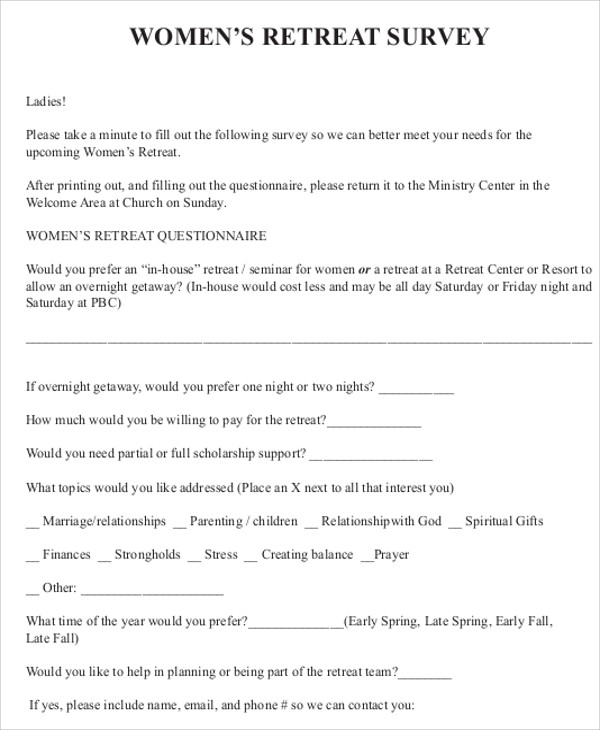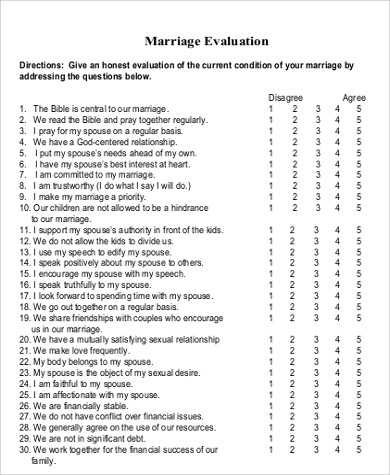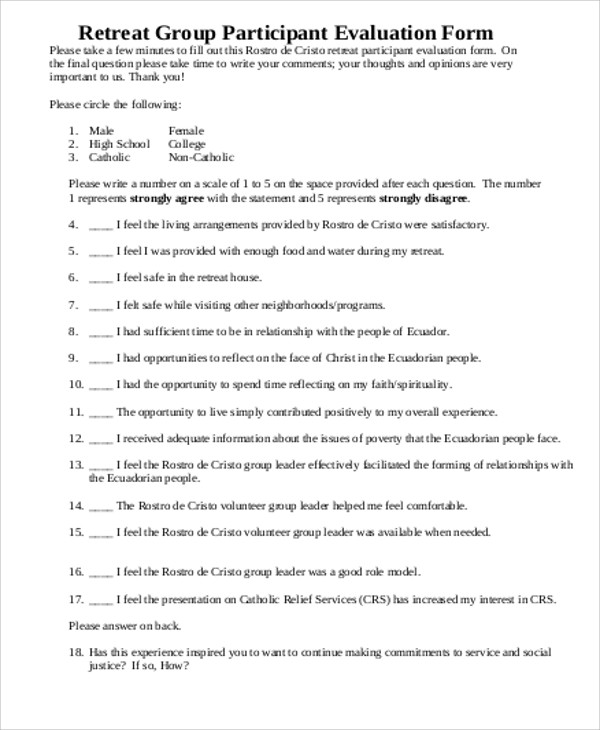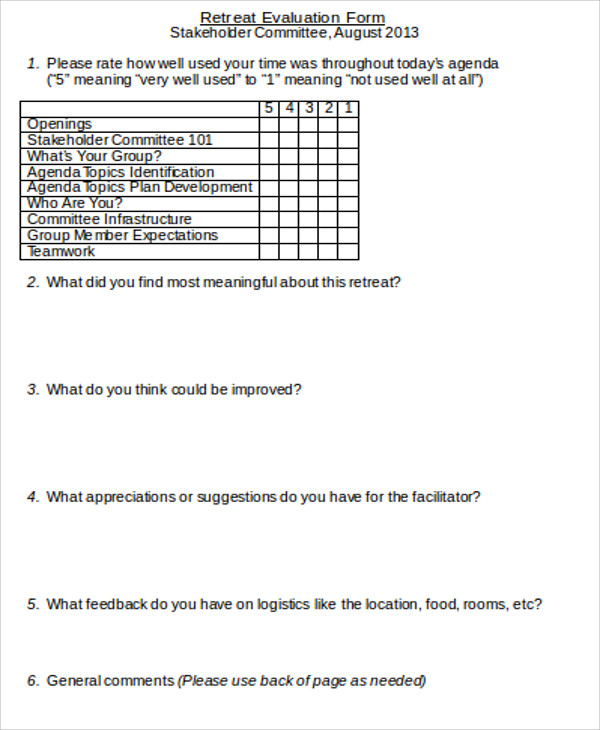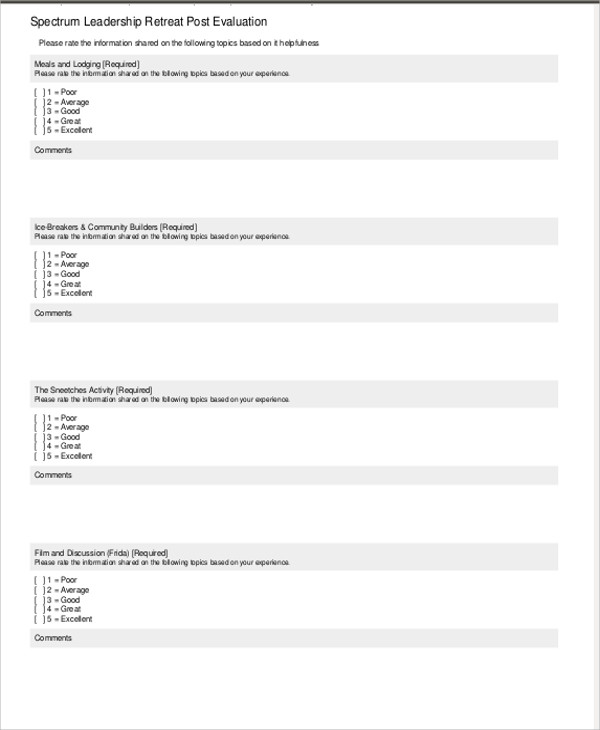A retreat could mean different things to different communities. In the religious setting, a spiritual retreat is a time for meditation, prayer, or reflection, and is an integral part in religious communities like Hindus, Buddhists, Islam, and certain denominations of Christianity.
Meditative retreats are believed by Buddhists and Hindus to be an intimate way of deepening their powers of insights and concentration. For Christians, the activities during their retreats may vary from denomination to denomination.
While commonly a religious activity, there, too, are non-religious retreats that focus on the development of the individual’s self-awareness and their personal growth.
If you are organizing a retreat, use these Sample Forms to help you evaluate the activity.
Sample Board Retreat Evaluation Form
Spiritual Retreat Evaluation Form
[/ns_row]
Youth Retreat Evaluation Form
Why Should a Retreat Be Evaluated
A retreat is a journey undertaken, either in solitude or with a group. While it may seem like it’s too personal an experience and that evaluating it would make it less than what it should, having retreats evaluated would help you, the facilitator, in more ways than one:
- Because no two people are alike, different activities would yield to different learnings and reflections for different people. Your participants’ takeaways from your activities would depend on their past experiences, beliefs, personal values, and perceptions. Getting feedback from them would help you anticipate possible responses during activities and thus, could help you ask the right questions that would lead to the insight you wish to impart.
- It doesn’t matter if your evaluation forms came in survey forms, close-ended or open-ended questionnaire forms; having the retreat activity evaluated by your participants would provide you with mathematical data to prove whether your retreat reached its desired outcome.
- Getting an evaluation would help you determine areas that need improvement not just in you as a facilitator but for the entirety of the activity you organized as well. Evaluations would help you determine what kinds of activities work with which types of clients. It also helps you identify which aspects of the retreat (and yourself) needs improvement, needs modifications, or which are doing great as they are.
Also see these Sample Peer Evaluation Forms and Performance Evaluation Forms to use as basis when designing evaluation forms.
Women’s Retreat Evaluation Form
Marriage Retreat Evaluation Form
Retreat Group Participant Evaluation Form
Retreat Evaluation Form Example
Leadership Retreat Post Evaluation Form
Retreat Evaluation Forms
Retreat evaluation forms are not that much different from the evaluation forms that trainers and lecturers would hand out after trainings and workshops. The evaluation forms should evaluate the following:
The Environment
The surroundings have a major effect on how the activities would unfold. Too noisy or cluttered an environment might distract the participants from their reflections. Have them rate the cleanliness and acoustics of the place. If the retreat is an overnight activity, ask them how comfortably they slept and to rate the food provided as well.
The Activities
These activities are the very reason your participants are attending the retreat in the first place. Ask them if they think that the contents of the retreat lived up to their expectations and whether their learnings and the activities they performed are in any way relevant to their objectives.
The Facilitator
You, as the facilitator, play a big role in the retreat. How well you could speak with, listen to, and reach out to each of the participants could be the make or break of the success of your retreat.
For more evaluation forms in improving oneself, see also these sample Self-Evaluation Forms.
Related Posts
Agreement Form Samples & Templates
Vehicle Inspection Forms Samples & Templates
Sample Employee Advance Forms
Sample Child Travel Consent Forms
Sample Testimonial Request Forms
Sample Employee Details Forms
Sample Divorce Forms
Sample Attestation Forms
Employee Performance Appraisal Form Templates
FREE 9+ Sample Presentation Evaluation Forms in MS Word
FREE 10+ School Admission Form Samples & Templates in MS Word | PDF
FREE 30+ Patient Consent Form Samples in PDF | MS Word
FREE 10+ Sample Sign Off Form Templates in PDF | MS Word
FREE 11+ Sample Medical Consultation Forms in PDF | MS Word
FREE 8+ Sample Donation Forms in PDF | MS Word
